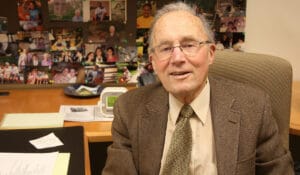As a medical researcher, Hiatt has credentials: he has served as the chair of the department of medicine at Beth Israel Hospital in Boston. Dean of the Harvard School of Public Health. Founding head of the cancer division of Beth Israel Hospital (now Beth Israel Deaconess Medical Center). And more. But he’s probably best known for something that started at the Pasteur Institute in Paris: he was part of the team that first identified and described messenger RNA, in 1961.

First, what’s RNA? To perhaps oversimplify, ribonucleic acid performs functions in the body as programmed by DNA, or deoxyribonucleic acid. The question is, how? Enter messenger RNA. mRNA is read by the ribosomes in every living cell to know “how” to synthesize proteins, which make the cells function.
But more than that, by modifying the mRNA to get the cells to make specific proteins, doctors can treat diseases, or create a natural immune response in the body to invaders — the idea behind the mRNA vaccines to fight Covid-19. And all this started back in the 1980s with work by Katalin Karikó and Drew Weissman, not in 2020 as some think. Indeed it was because of that early research that the Covid-19 vaccines were able to be created so quickly: the basis was already in place. Prior vaccines work by introducing weakened or “dead” viruses to trigger an immune response. mRNA vaccines don’t include actual viruses, so it’s impossible to get the disease from them. It was such a breakthrough that Karikó and Weissman shared the 2023 Nobel Prize in Physiology or Medicine for that portion alone. They stood on the shoulders of giants like Howard Hiatt and others on his team at Pasteur who laid the groundwork.
Hiatt went on to become the co-founder and Associate Chief of the Division of Social Medicine and Health Inequalities at the Brigham and Women’s Hospital, and was also the Associate Chief of the hospital’s Division of Global Health Equity. Why was equity and access so important to him? It was personal: he barely made it into Harvard Medical School in the 1940s because the school had quotas for Jews; his father had immigrated to the U.S. alone; the rest of his family was later killed in the Holocaust. He was effective as the dean of the Harvard School of Public Health (1972-1984): he doubled the school’s endowment, and created a Department of Health Policy and Management.
Hiatt also wrote about the health implications of the nuclear arms race, telling then-President Ronald Reagan to imagine a tiny 1-megaton nuclear weapon exploding in Washington, destroying George Washington University Hospital — where the president was treated for gunshot wounds a few months before. “I tried to personalize it for the President,” he said. “I told him there would be 800,000 people in shock from burns and radiation. … Given these facts, those people who talk about winning or surviving a nuclear war don’t understand what they are talking about.” Dr. Howard Haym Hiatt, M.D., died at his home in Cambridge, Mass., on March 2. He was 98.

Thanks for this, Randy. Dr. Hiatt was a giant in his field.
I hope you and Kit will be happy aboard ship, and that the air purification system never crashes.